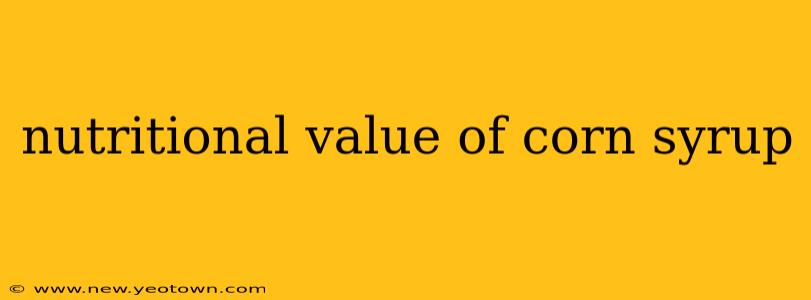Corn syrup. The name conjures images of sugary treats and processed foods, and for good reason. But what exactly is corn syrup, and what's the real story behind its nutritional value – or lack thereof? Let's delve into this sticky subject.
Corn syrup, in its simplest form, is a sweetener produced from the starch of corn. It's a crucial ingredient in countless processed foods, beverages, and candies, offering manufacturers a cheap and readily available way to add sweetness. However, understanding its nutritional value requires looking beyond just its sugar content.
What are the main types of corn syrup?
There are several types of corn syrup, each with slightly different properties and uses:
- High-fructose corn syrup (HFCS): This is the most common type, known for its high fructose content. The process of converting corn starch to HFCS involves enzymatic reactions that increase the fructose proportion, resulting in a sweeter product than regular corn syrup.
- Regular corn syrup: This type has a lower fructose content compared to HFCS and is often used in baking and other food applications where a less intense sweetness is desired.
- Glucose syrup: Often derived from corn, but also other starches. Essentially a partially hydrolyzed starch, it has a milder sweetness than HFCS and is used as a humectant, enhancing the moisture retention of foods.
Does corn syrup have any nutritional value?
This is where the story takes a turn. The answer is a resounding "not really". While corn syrup does provide calories, it's essentially devoid of vitamins, minerals, or fiber. It's pure carbohydrate, offering empty calories that contribute to weight gain without providing any significant nutritional benefit. This is a key difference from more nutrient-rich sweeteners like honey or maple syrup, which contain trace amounts of vitamins and minerals.
Is corn syrup bad for your health?
The impact of corn syrup on health is a complex issue, fueled by ongoing research and debate. However, a few points are generally accepted:
- High calorie content: The primary concern is the high calorie density of corn syrup, contributing to weight gain and potentially obesity.
- Increased risk of chronic diseases: High consumption of added sugars, including corn syrup, is linked to an increased risk of type 2 diabetes, heart disease, and non-alcoholic fatty liver disease (NAFLD).
- Potential impact on gut health: Some research suggests that HFCS may negatively impact the gut microbiome, although more research is needed to fully understand this relationship.
Is high-fructose corn syrup worse than sugar?
This is a frequently asked question, and the answer is nuanced. While both HFCS and regular sugar (sucrose) are primarily composed of fructose and glucose, HFCS has a higher fructose proportion. This difference might contribute to a more significant impact on liver metabolism and potentially increase the risk of health issues compared to sucrose. However, the overall effect of sugar consumption is a more pressing concern than focusing solely on the differences between HFCS and sucrose. Moderation is key with both.
What are some healthier alternatives to corn syrup?
Fortunately, there are healthier alternatives to satisfy your sweet tooth:
- Honey: A natural sweetener with trace amounts of vitamins and minerals.
- Maple syrup: Similar to honey, offering a natural sweetness and some nutritional value.
- Agave nectar: Another natural sweetener, but be mindful of its high fructose content.
- Stevia and other natural sweeteners: These are calorie-free options, but their intense sweetness might require adjustment in recipes.
The Bottom Line: Moderation and Informed Choices
Corn syrup, particularly HFCS, offers little to no nutritional value and is linked to various health risks when consumed excessively. Making informed choices and opting for healthier alternatives, along with maintaining a balanced diet and active lifestyle, is crucial for overall health and well-being. It's not about eliminating all sweetness, but rather about making conscious decisions to consume added sugars, including corn syrup, in moderation. The sweet taste doesn't have to come at the expense of your health.

